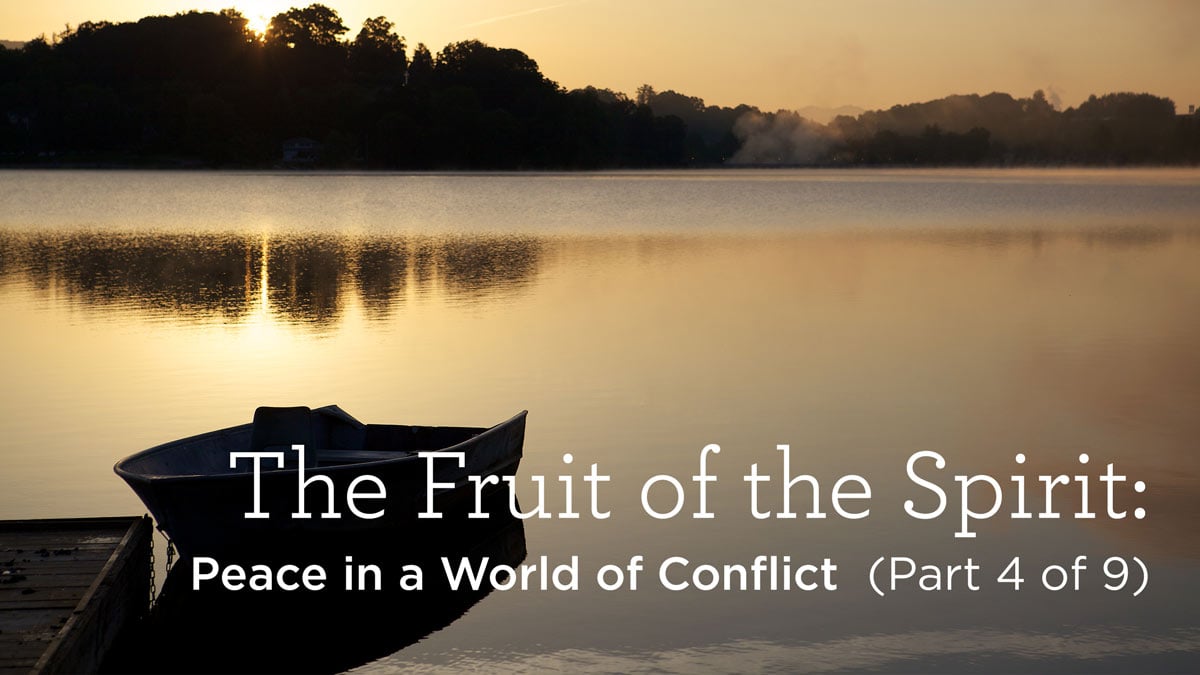
Our world lacks peace. Just consider: historians estimate that since the sixteenth century, over eight thousand peace treaties have been signed, presumably with the intent that the resulting peace would last forever—yet most of them endured little more than two years. Instead, conflict and chaos are everywhere, and wherever calamity doesn’t reign, it remains nearby, lurking around every corner.
The story of conflict goes back to the garden of Eden and reaches forward to today. As it was in mankind’s earliest days, so it is now: brothers and sisters, parents and children, husbands and wives, and nations and people groups all remain at war. Peace may be in high demand, but it’s clearly in much too short a supply.
Thankfully, the Bible not only identifies the source of this conflict for us but also proclaims the news of the Prince of Peace who can rescue us from endless tumult. “He himself is our peace,” Ephesians 2:14 tells us. To getter a better view of the peace the Bible envisions and calls us to in Christ, let’s consider (1) what this peace is, (2) why we need it, (3) where we can find it, and (4) how we can have it.
What Is Peace?
From a biblical perspective, peace is not simply the absence of turmoil or conflict. As nice as an end to calamity or quarrel might be, the peace of God is actually about fullness and wholeness. The peace of God is knowing that our debts to Him have been canceled, that our accounts, as it were, are in a favorable balance on the basis of Christ’s finished work on the cross. The power of such peace is that it actually enables an individual, her community, and ultimately the world to flourish as God ordains.
The oft-recited Aaronic blessing from Numbers 6:24–26 gives us a glimpse into the source of such peace:
The LORD bless you and keep you;
the LORD make his face to shine upon you and be gracious to you;
the LORD lift up his countenance upon you and give you peace.
The peace of God, these verses suggest, comes with the light of God’s grace and the blessing of His goodness. And where might we look to find such light? Second Corinthians tells us that God “has shone in our hearts to give the light of the knowledge of the glory of God in the face of Jesus Christ” (4:6). Though we do not see Christ with our physical eyes (1 Peter 1:8), we still find in Him the grace that brings us into God’s endless favor.
At Jesus’ birth, the angels announced, “Glory to God in the highest, and on earth peace among those with whom he is pleased” (Luke 2:14). What else might we expect the promised Prince of Peace to bring? He offers peace with God, peace with others, and peace within—a threefold peace that can endure through life’s most unwelcome circumstances.
Why Do We Need Peace?
Christ offers us bountiful peace. But what good is such peace to us if we remain uncertain as to why we need it?
Search the Scriptures, and you’ll soon find three main reasons for our lack of peace:
A — We are by nature alienated from God.
B — We are in bondage to our own sinful desires.
C — We are in conflict not only with God and with others but also with ourselves.
This alienation, bondage, and conflict is exactly why we need peace that only God can provide. We need to be reconciled to our Lord; we need to be set free from the shackles of sin; and we need to find victory in the relational and personal battles we so often fight.
If we reject God’s terms of peace, then we remain forever unsettled, “like the tossing sea” (Isa. 57:20). As Isaiah 48:22 informs us, “‘There is no peace,’ says the LORD, ‘for the wicked.’” Most of us have tasted such tumult at one point or another. Consider just five common reasons we may experience a lack of peace:
1. Unwelcome circumstances.
Have you ever experienced something that caused you to ask, “Why this? Why me? Why now?” You’re certainly not alone! Unless we have identified the fact that God is sovereign over all our circumstances and desirous to bring ultimate good through them (Rom. 8:28), when life takes a sudden and unexpected downward turn, we will inevitably be robbed of peace.
2. Unconfessed sin.
If we find that we don’t have a sense of genuine peace and contentment in God, then we may need to consider whether there are any sins we have begun to tolerate—“secret” iniquities that we have tried to tuck away. Disobedience to God and genuine, heartfelt peace do not and cannot go hand in hand.
Disobedience to God and genuine, heartfelt peace do not and cannot go hand in hand.
3. Uncertainty.
It’s rare that we can predict precisely how our next hours, let alone days or weeks, will unfold. Sure, we can guess—and sometimes we make pretty accurate conjectures. But unless we have a confidence in the God who cares for every sparrow (Matt. 10:29), peace will remain elusive as long as we fixate on life’s uncertainties.
4. Pain from our past.
Not only can the future make us uncertain, but the past can haunt us—especially our guilt over past sins and failures. But if that guilt has been lain on Jesus Christ, then God says to us, “I, I am he who blots out your transgression for my own sake, and I will not remember your sins” (Isa. 43:25). God’s redeeming action won’t necessarily erase the past from your memory, but it will liberate you to walk forward in freedom.
5. Uncontrolled desires.
Illicit yearnings also rob us of peace. We’ll never know peace while we’re wracked with feelings of envy, greed, anger, jealousy, and lust—and especially if we decide to act upon them.
Where Can We Find Peace?
Our need for peace is apparent. So where can we uncover the peace our hearts long for?
Galatians reminds us that true peace grows only in followers of Jesus Christ as a facet of the fruit of the Spirit (5:22). Peace, in other words, is found not in a program nor in a philosophy but in a person: Jesus Christ.
Peace is found not in a program nor in a philosophy but in a person: Jesus Christ.
As Jesus was getting ready to take leave of His disciples, He bookended His discourse before His High Priestly Prayer with terms of peace. “Let not your hearts be troubled,” He said at the start. How? “Believe in God; believe also in me” (John 14:1). He then closed by saying, “I have said these things to you, that in me you may have peace. In the world you will have tribulation. But take heart; I have overcome the world” (John 16:33, emphasis added).
Notice that Jesus did not say that it would be in His ideas or in obedience to His commands that we would find peace; He said that it would be “in me.” As Ephesians 2:14 reminds us, “He himself is our peace.” For pervasive peace, we must look no further than the Son of God.
How Can We Have Peace?
Still, knowing where to find peace doesn’t necessarily mean we have it, nor does it mean that we understand how to get it. If God is the only one who can give peace, then what does He require?
It can be tempting to think that God grants peace to us for “getting our affairs in order”—tidying up, waking up earlier, working harder, killing some bad habits, starting some better ones, etc. But we all know that some of the most put-together people still don’t know peace. No, God doesn’t ask for some work or deed of ours. What He requires is that we cry out to Him.
When Jesus passed in front of him, the blind beggar Bartimaeus could not, of course, see Him. Nevertheless, this blind man knew full well that he was in the presence of greatness—and so he cried out, “Jesus, Son of David, have mercy on me!” (Mark 10:47), and then a second time implored, “Son of David, have mercy on me!” (v. 48). In a sense, Bartimaeus was casting all his anxieties upon Jesus, as 1 Peter 5:7 instructs us to do. He placed all his hopes for wellness and peace in Christ—and because Christ cared for this poor beggar, He responded, “Your faith has made you well” (Mark 10:52), and the blind man was at last healed and whole.
Such healing is possible for all who believe. Because our Lord Jesus Christ bore the penalty that our sins deserve, we can enjoy the peace that He provides. As the prophet proclaimed,
He was pierced for our transgressions;
he was crushed for our iniquities;
upon him was the chastisement that brought us peace,
and with his wounds we are healed. (Isa. 53:5)
The Christian life is neither a plastic veneer of superficial brightness nor a stolid march of cynicism and stoicism in the face of life’s troubles. Instead, the fruit of the Spirit is to be genuine peace—and it can be so because Christ endured chastisement on our behalf. He withstood all the world’s dispeace—its distress, its turmoil, its hostility, its unrest, its torment—all so that when we, like Bartimaeus, cry out to Him for mercy, we can know an everlasting peace that will guard us for a lifetime and more (Phil. 4:7).
This article was adapted from the sermons “Peace — Part One” and “Peace — Part Two” by Alistair Begg. Subscribe to get weekly blog updates as this series of new articles is published.
Topics: Articles
